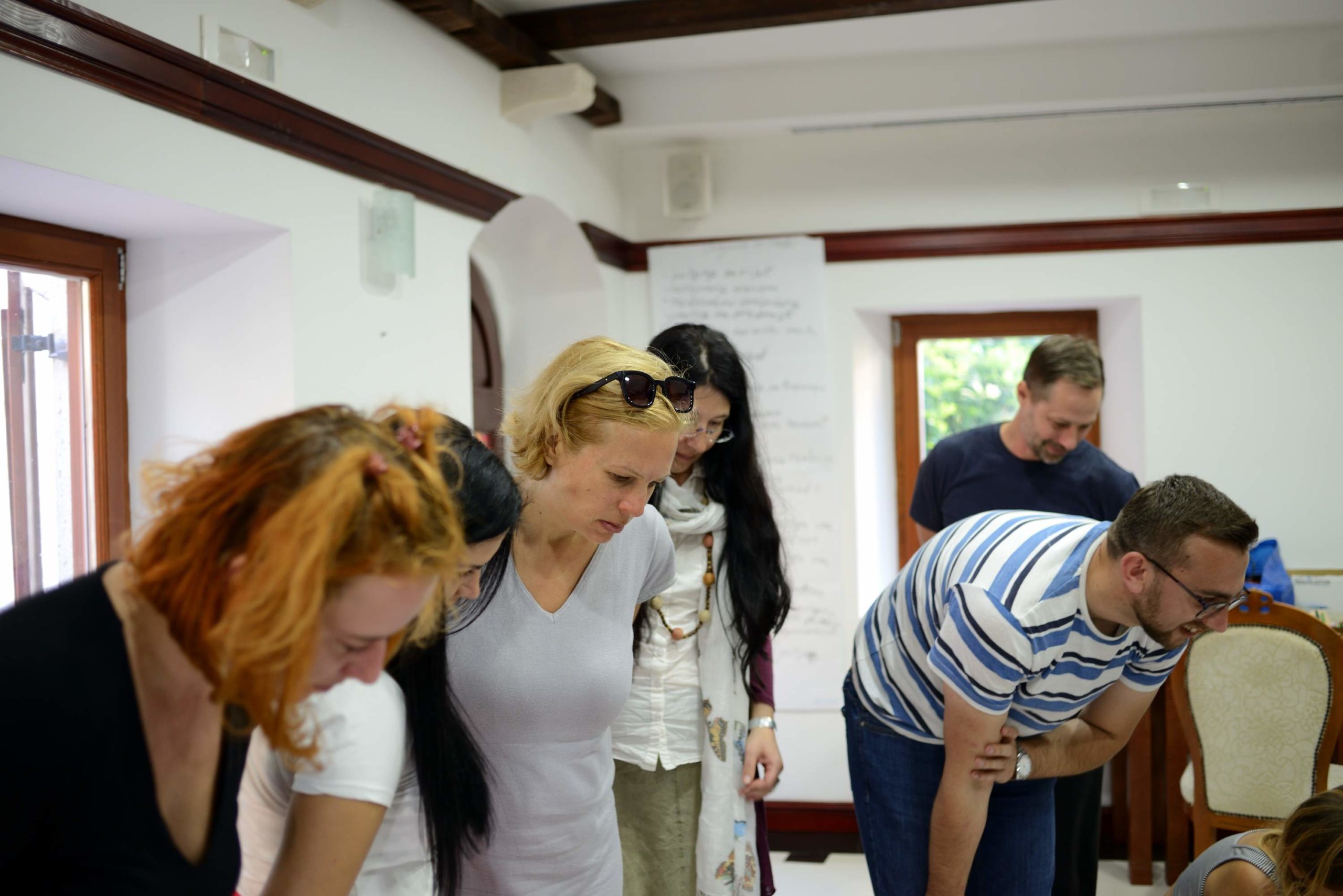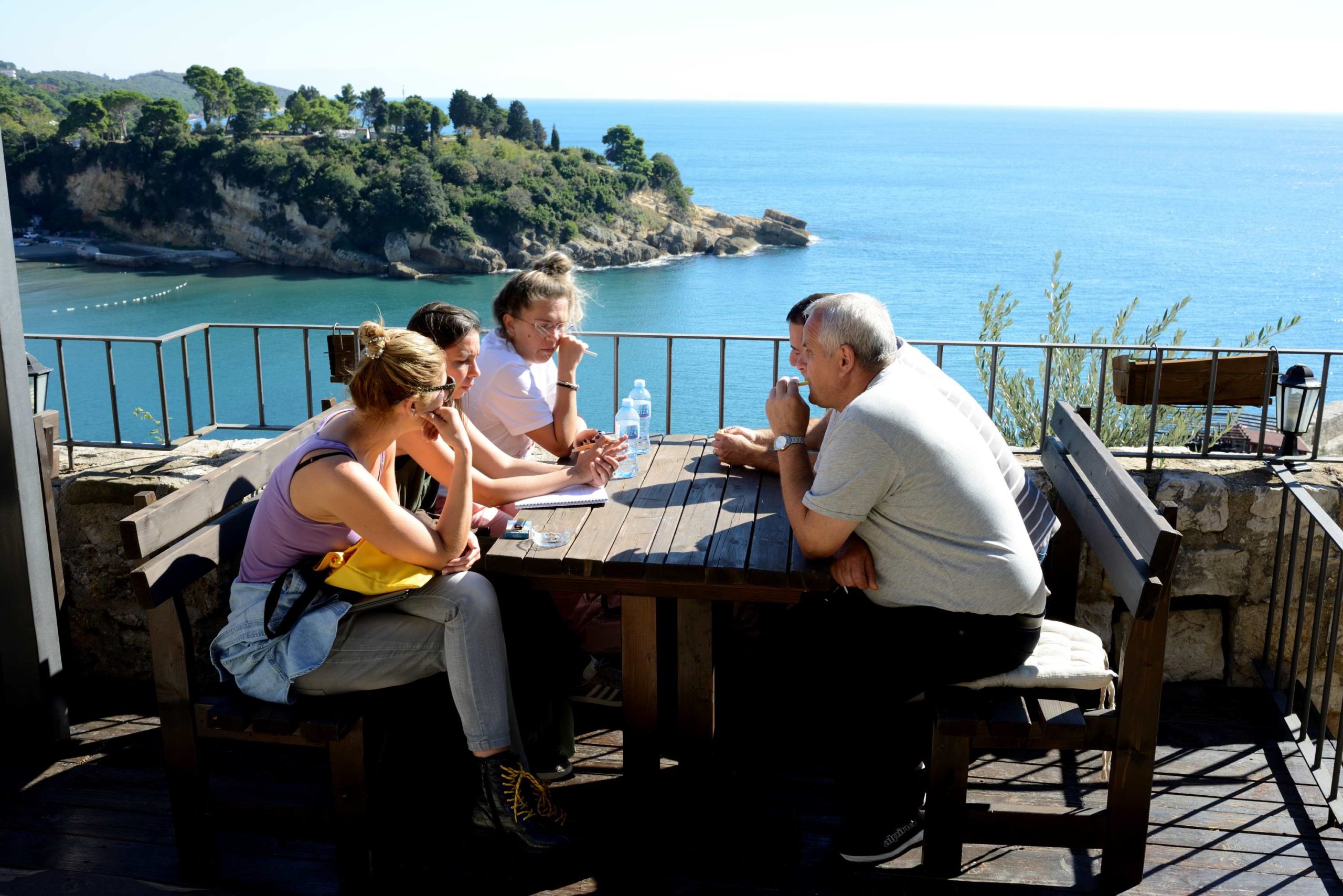Some statistics to start
The 44th Basic Training in Peacebuilding organised by the Centre for Nonviolent Action Sarajevo/Belgrade was held in Ulcinj, Montenegro from 14 to 24 October.
We had received a total of 104 applications, the majority from Bosnia and Herzegovina (46), followed by Serbia (16), 12 each from Macedonia, Croatia and Montenegro, and 6 from Kosovo. The number of women applying was higher (58) compared to the number of men (46), which influenced the selection of participants, because apart from regional and age diversity, we also aim for equal gender representation. Once again, we had a few last-minute cancellations, but this gave the people willing to stay on the waiting list to the last day a chance to participate. We are very grateful to those who were invited at the last minute and confirmed their participation at short notice. Ultimately, our group was made up of 20 participants, 12 women and 8 men, and they were from Bosnia and Herzegovina (8), Croatia (4), Serbia (3), Macedonia (2), Montenegro (2) and Kosovo (1). They ranged in age from 23 to 60 (average age: 34).
The training team consisted of Ivana Franović, Tamara Zrnović and Amer Delić from the Centre for Nonviolent Action Sarajevo/Belgrade and our long-time friend and associate Luan Imeri from the Centre for Human Rights and Conflict Resolution in Skopje.
We connected quickly
We were in a group with a wide range of ages, a motley of professions and various levels of life experience. This did not, however, prevent us from connecting quickly and building mutual trust. The need for others to be heard created a feeling of safety and from the first day and the first workshop, there was a high degree of openness and a strong wish to get to know contexts, overcome obstacles, exchange and cooperate. Taking into account the needs of the group and the feedback that we had gone too deep into evoking traumatic experiences with one exercise, we did our best to adapt the rest of the training. All of this contributed to a good atmosphere and an opening of perspectives for dealing with the most demanding topics, making it possible to achieve considerable progress over the course of the training. The key workshops dealt with the topics of: violence, prejudice and discrimination, identity, gender roles in society, dealing with the past and peacebuilding.
Categorised
The prejudices based on ethnicity that we hear about each other do not have a single point of reference, they differ depending on the setting. By bringing awareness to the existing nationalist patterns that maintain the matrix of intolerance and fear, we want to encourage dialogue to air out both the grievances we have in respect of each other and the feelings of hurt inherent to the feeling of collective guilt we are often exposed to even though we have no individual guilt. While conscious that we often do not see ourselves in the roles that have been assigned to us, these things are present in our societies and by recognising them, we open up the possibility to act and fight against them.
The workshop on gender roles in society was dynamic and elicited the strongest emotions and responses. This just goes to show that there is still a pressing need in this region to sensitise people for different types of human rights and equality in society, but also in the family. Everyone made an effort to at least try to communicate their completely different experiences of injustice and discrimination. The attitude towards the Other and those who are different is key for peace building, and it is to a large extent reflected in the position of women in society, as well as the role assigned by the patriarchy to men. In recent years, we have seen a return to traditional, patriarchal patterns in our societies. Ultimately, even though there was heated discussion and some difficult moments, the workshop did lead to greater understanding and bonding within the group.
Balkan weight of the past
Our work on dealing with the past, and then on peacebuilding, was very constructive and productive. The armed conflicts from our recent past are a shared legacy, but as can be expected, we have different views of that period. The training aims to initiate a conversation about the relations between Western Balkan countries, because we are still living in a period that is more post-war than peace. And it is evident that we know little about each other, despite sharing a common past, including the misfortune of having experienced war after the break-up of Yugoslavia. Even when we receive information from our neighbouring countries in the region, it is at the level of daily news or media reports that are most often one-sided and politicised. This makes it difficult to feel the needs and problems of others, and on that basis to find points of connection that could serve as springboards for cooperation. It is, therefore, especially important and valuable to meet real people from other countries, as someone you can contact to check information, ask them what they see and identify as problematic in their countries and what bothers them when it comes to the relations and attitudes of our countries or societies to each other.
This exchange also gave us an opportunity to present CNA’s work on peacebuilding and the challenges we face, which in turn allowed the participants to present ideas they considered important and would like to see put into practice as a way to contribute to building lasting and stable peace and taking a step towards reconciliation.
Concluding remarks
From this perspective, now that the many impressions have settled, the conclusion is that over ten short days, we went through a lot together. Like a fast train, we sped through barriers that were at least ostensibly obstacles, be they national borders, ethnic or gender identities – it was more difficult with the generational gaps and those most hardened barriers installed in our heads. We worked at full capacity, spent ourselves mentally on difficult topics, but we also had time for rest and informal socialising.
We lacked time and space for delving deeper into the situation in Ukraine, issues of homophobia, prejudice against refugees… There are many more topics that could be included in the training.
Humour was a tool that bolstered us and helped us persevere, we used laughter to suppress sighs and tears and managed to bond as a team of old friends with an important task, nonetheless.
It was challenging to do this training after a two-year hiatus on account of the COVID-19 pandemic. We had decided on pausing activities after having realised that the digital transformation had some serious limitations in our case, because these exchanges only make sense in person and it is virtually impossible to do this kind of training online.
The pandemic has also resulted in many broken connections, both personal, due to isolation and social neglect of the most vulnerable, and literal, such as public transport. We know that it had been complicated to get to Ulcinj from some areas even before, but at least it was doable. Today, numerous bus lines are no longer in operation or only run rarely. However, we managed to overcome that challenge successfully in the end.
We would like to thank all the participants for their dedicated work and the motivation they gave us.
We are also grateful to the staff at the Palata Venezia hotel who were extremely kind and always there to help. On our last night, they even organised a party for us and treated us to drinks. When asked why they decided to do so, they said, “We could tell you needed it.”
It doesn’t get better than that.

